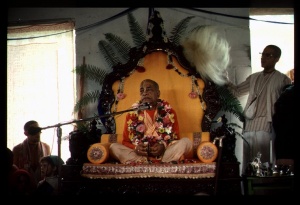SB 2.1.2: Difference between revisions
No edit summary |
(Vanibot #0054 edit - transform synonyms into clickable links, which search similar occurrences) |
||
| Line 23: | Line 23: | ||
<div class="synonyms"> | <div class="synonyms"> | ||
''śrotavya-ādīni'' | ''[//vanipedia.org/wiki/Special:VaniSearch?s=śrotavya&tab=syno_o&ds=1 śrotavya]-[//vanipedia.org/wiki/Special:VaniSearch?s=ādīni&tab=syno_o&ds=1 ādīni]'' — subject matters for hearing; ''[//vanipedia.org/wiki/Special:VaniSearch?s=rājendra&tab=syno_o&ds=1 rājendra]'' — O Emperor; ''[//vanipedia.org/wiki/Special:VaniSearch?s=nṛṇām&tab=syno_o&ds=1 nṛṇām]'' — of human society; ''[//vanipedia.org/wiki/Special:VaniSearch?s=santi&tab=syno_o&ds=1 santi]'' — there are; ''[//vanipedia.org/wiki/Special:VaniSearch?s=sahasraśaḥ&tab=syno_o&ds=1 sahasraśaḥ]'' — hundreds and thousands; ''[//vanipedia.org/wiki/Special:VaniSearch?s=apaśyatām&tab=syno_o&ds=1 apaśyatām]'' — of the blind; ''[//vanipedia.org/wiki/Special:VaniSearch?s=ātma&tab=syno_o&ds=1 ātma]-[//vanipedia.org/wiki/Special:VaniSearch?s=tattvam&tab=syno_o&ds=1 tattvam]'' — knowledge of self, the ultimate truth; ''[//vanipedia.org/wiki/Special:VaniSearch?s=gṛheṣu&tab=syno_o&ds=1 gṛheṣu]'' — at home; ''[//vanipedia.org/wiki/Special:VaniSearch?s=gṛha&tab=syno_o&ds=1 gṛha]-[//vanipedia.org/wiki/Special:VaniSearch?s=medhinām&tab=syno_o&ds=1 medhinām]'' — of persons too materially engrossed. | ||
</div> | </div> | ||
Latest revision as of 21:11, 17 February 2024

A.C. Bhaktivedanta Swami Prabhupada
TEXT 2
- śrotavyādīni rājendra
- nṛṇāṁ santi sahasraśaḥ
- apaśyatām ātma-tattvaṁ
- gṛheṣu gṛha-medhinām
SYNONYMS
śrotavya-ādīni — subject matters for hearing; rājendra — O Emperor; nṛṇām — of human society; santi — there are; sahasraśaḥ — hundreds and thousands; apaśyatām — of the blind; ātma-tattvam — knowledge of self, the ultimate truth; gṛheṣu — at home; gṛha-medhinām — of persons too materially engrossed.
TRANSLATION
Those persons who are materially engrossed, being blind to the knowledge of ultimate truth, have many subject matters for hearing in human society, O Emperor.
PURPORT
In the revealed scriptures there are two nomenclatures for the householder’s life. One is gṛhastha, and the other is gṛhamedhī. The gṛhasthas are those who live together with wife and children but live transcendentally for realizing the ultimate truth. The gṛhamedhīs, however, are those who live only for the benefit of the family members, extended or centralized, and thus are envious of others. The word medhī indicates jealousy of others. The gṛhamedhīs, being interested in family affairs only, are certainly envious of others. Therefore, one gṛhamedhī is not on good terms with another gṛhamedhī, and in the extended form, one community, society or nation is not on good terms with another counterpart of selfish interest. In the Age of Kali, all the householders are jealous of one another because they are blind to the knowledge of ultimate truth. They have many subject matters for hearing — political, scientific, social, economic and so on — but due to a poor fund of knowledge, they set aside the question of the ultimate miseries of life, namely miseries of birth, death, old age and disease. Factually, the human life is meant for making an ultimate solution to birth, death, old age and disease, but the gṛhamedhīs, being illusioned by the material nature, forget everything about self-realization. The ultimate solution to the problems of life is to go back home, back to Godhead, and thus, as stated in the Bhagavad-gīta(BG 8.16), the miseries of material existence — birth, death, old age and disease — are removed.
The process of going back home, back to Godhead, is to hear about the Supreme Lord and His name, form, attributes, pastimes, paraphernalia and variegatedness. Foolish people do not know this. They want to hear something about the name, form, etc., of everything temporary, and they do not know how to utilize this propensity of hearing for the ultimate good. Misguided as they are, they also create some false literatures about the name, form, attributes, etc., of the ultimate truth. One should not, therefore, become a gṛhamedhī simply to exist for envying others; one should become a real householder in terms of the scriptural injunctions.